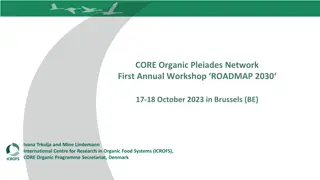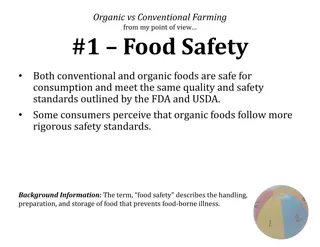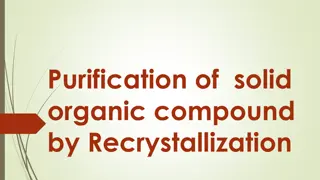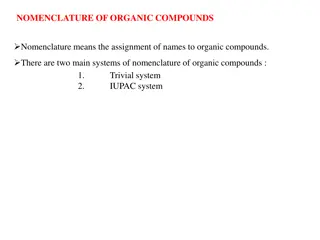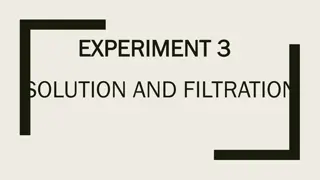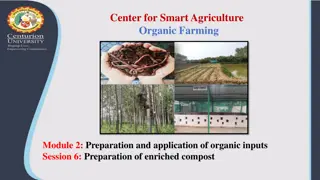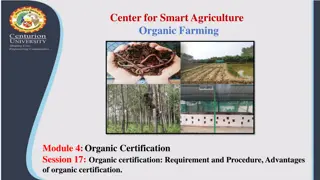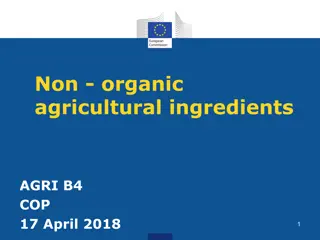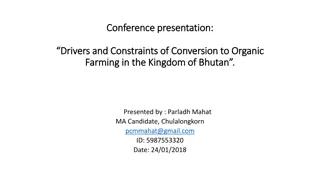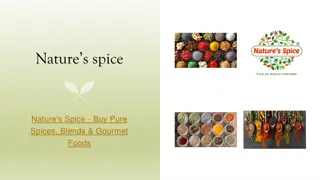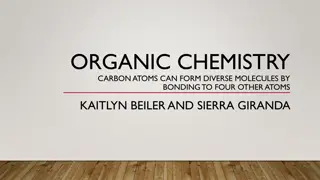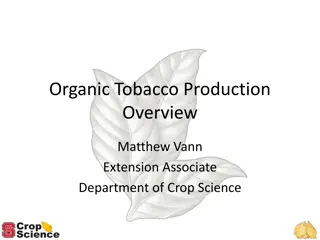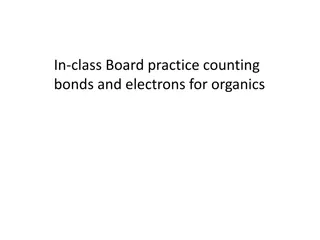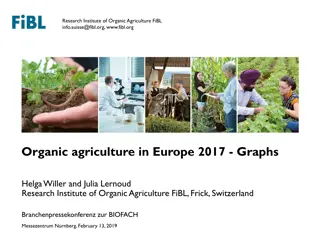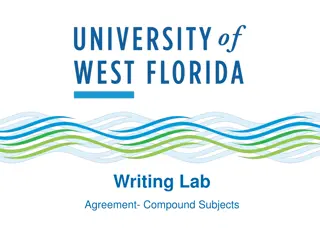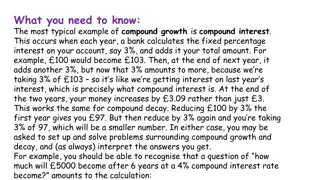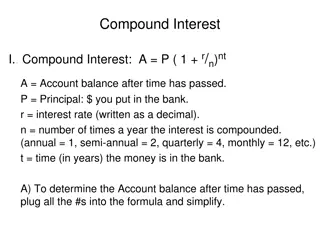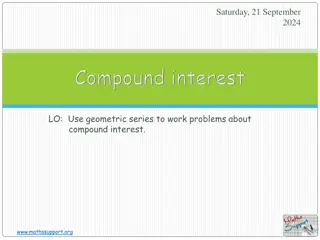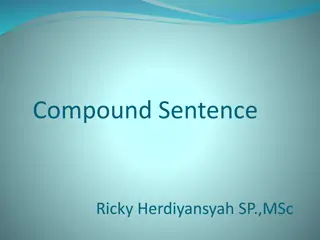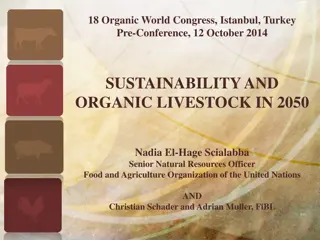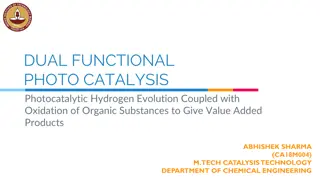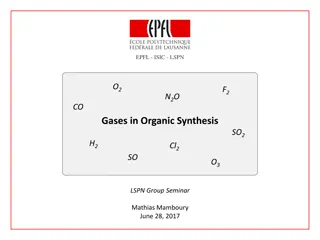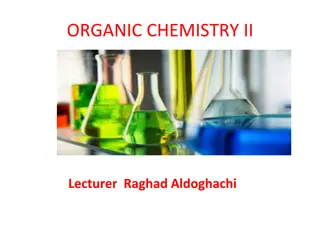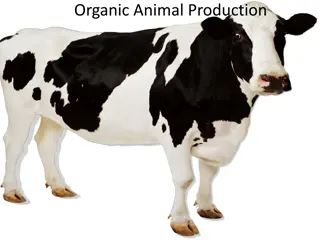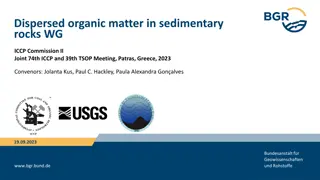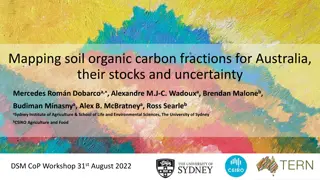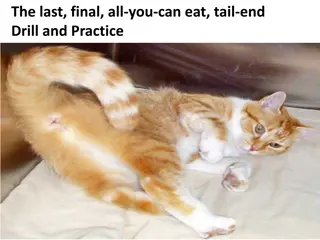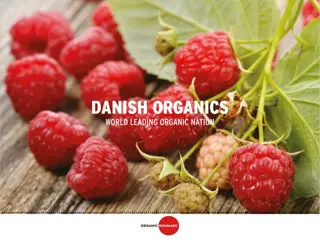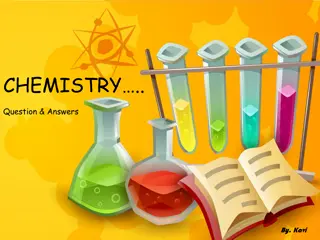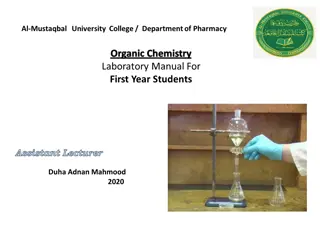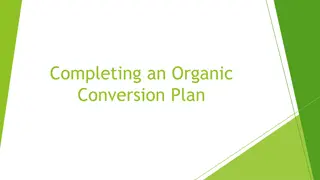CORE Organic Pleiades Network First Annual Workshop Roadmap 2030 - Event Recap
The CORE Organic Pleiades Network held its first annual workshop in Brussels, focusing on organic research and innovation in the European agri-food sector. The event discussed HEU partnerships, national/regional action plans, research funding, and more. CORE Organic aims to enhance knowledge and inn
0 views • 37 slides
Understanding the Diels-Alder Reaction in Practical Organic Chemistry
The Diels-Alder reaction is a fundamental method in organic chemistry for producing cyclic organic compounds by combining a conjugated diene with an alkene. This reaction, named after Otto Diels and Kurt Alder, involves the formation of a six-membered ring with specific bond rearrangements. Conjugat
4 views • 15 slides
Mastering the Use of Hyphens in Compound Adjectives
Hyphens play a vital role in creating compound adjectives by joining words together to form longer descriptive phrases. This guide provides tips on identifying, using, and creating compound adjectives with hyphens to enhance your writing skills. Discover the importance of hyphens in maintaining clar
0 views • 8 slides
Sentence Structures: Simple, Compound, Complex, and Compound-Complex
Learn about the different types of sentence structures - simple, compound, complex, and compound-complex - through examples and definitions. Understand the components of clauses and sentences, including independent and dependent clauses, to enhance your understanding of English grammar.
2 views • 11 slides
Organic vs Conventional Farming: An Overview
In the debate between organic and conventional farming, both methods have their pros and cons. While organic foods are perceived to follow stricter safety standards, both types meet FDA and USDA regulations. They offer similar nutritional value, but organic farming tends to have lower efficiency due
0 views • 6 slides
Recrystallization for Solid Organic Compound Purification
Recrystallization is a laboratory technique used to purify solids based on their different solubilities. It involves dissolving an impure solid in a suitable solvent, cooling the solution to allow pure crystals to form, filtering to isolate the purified solid, and drying it. Finding a good recrystal
1 views • 11 slides
Overview of Organic Compounds Nomenclature
Nomenclature of organic compounds involves assigning names based on two main systems - Trivial system and IUPAC system. Trivial system utilizes names related to discoverers or sources, often with Latin or Greek roots. Saturated hydrocarbons, known as paraffins, contain single bonds and are less reac
0 views • 27 slides
Understanding Compound Interest in Class VIII Mathematics
In this chapter, students will learn about simple interest and compound interest, memorize their formulas, derive compound interest formula from simple interest concept, calculate compound interest with different compounding frequencies, understand growth and depreciation concepts, and derive formul
1 views • 29 slides
Separation and Purification of Organic Compounds: Methods and Techniques
The separation and purification of organic compounds are essential processes to obtain pure products, as impurities and side reactions can affect the quality of the compounds. Methods such as solution and filtration, crystallization, distillation, extraction, sublimation, and chromatography are comm
8 views • 15 slides
Enhancing Compost Quality for Organic Farming: Phosphorous-Enriched Compost Preparation
Composting is a natural process crucial for organic farming. Enriched compost improves nutrient supply to crops. Learn how to prepare phosphorous-enriched compost using organic wastes, bio-inoculants, and rock phosphate. Follow a method involving layering organic materials, cow dung, and rock phosph
3 views • 8 slides
Understanding Organic Certification and NPOP in India
Organic certification is crucial for ensuring the quality and authenticity of organic products. This involves adhering to strict production standards and undergoing periodic inspections. In India, the National Programme on Organic Production (NPOP) plays a significant role in certifying organic comm
0 views • 10 slides
Concerns and Recommendations on Non-Organic Agricultural Ingredients
Various Member States express concerns about the inclusion of new non-organic agricultural ingredients in Regulation 889/2008 Annex IX, emphasizing the need to maintain the integrity of organic production. Suggestions include keeping the list as short as possible, searching for organic alternatives,
0 views • 19 slides
Exploring Drivers and Constraints of Conversion to Organic Farming in Bhutan
Population in Bhutan heavily relies on agriculture, but the transition to organic farming has been slow despite the desire to reduce chemical use. This presentation investigates the current state of organic farming, identifies key factors affecting conversion, and offers policy recommendations to pr
0 views • 22 slides
organic chana masala
Nature\u2019s Spices Organic Chana Masala is a meticulously curated blend of organic spices, crafted to elevate the flavor of chickpea dishes. Sourced from certified organic farms, our masala blend is free from additives and artificial ingredients, e
1 views • 6 slides
Overview of Global Farmed Salmon and Organic Production
The data showcases the production figures for global farmed salmon across various countries, with Norway leading the production, followed by Chile, Scotland, and others. Additionally, insights into the growing organic salmon production, vulnerabilities in the sector, and details on organic mussels p
0 views • 9 slides
Understanding Organic Chemistry: Carbon Atoms and Molecular Diversity
In organic chemistry, carbon atoms can form diverse molecules by bonding to four other atoms, leading to molecular complexity and diversity. The versatile nature of carbon allows for the formation of various carbon skeletons, contributing to the vast array of organic compounds. Hydrocarbons, consist
0 views • 12 slides
Organic chicken masala
Organic Chicken Masala is a meticulously blended combination of premium organic spices, designed to elevate the taste and aroma of chicken dishes. Sourced from certified organic farms, our masala guarantees purity and is free from chemicals and pesti
1 views • 6 slides
Guide to Organic Tobacco Production Process
Understand the process of organic tobacco production including obtaining a contract, certifying land, inspections, maintaining certification, selling leaf, and transitioning from conventional to organic production. Get insights on organic certification through USDA-National Organic Program, required
0 views • 18 slides
Understanding Bonds and Electrons in Organic Compounds
Explore the world of organic chemistry by delving into the concepts of bonds, electrons, and their roles in determining properties of organic compounds. Discover why saturated fats are considered unhealthy, learn about bond energies, lengths, and orders, and unravel the mysteries of organic compound
0 views • 13 slides
Overview of Organic Agriculture in Europe 2017
Europe has seen a significant increase in organic farmland and retail sales in 2017. With 2.9% of Europe's farmland being organic, totaling 14.6 million hectares, countries like Spain, Italy, and France lead in organic farming. In terms of retail sales, Denmark and Switzerland stand out with high pe
0 views • 9 slides
Insights into U.S. Organic Industry Trends and Outlook
The U.S. organic industry is experiencing positive consumer demand growth, with organic food sales reaching $56 billion in 2020. Despite a decline in organic dairy sales, the overall organic acreage growth remains strong. The market faces challenges such as the impact of COVID-19, the need for produ
0 views • 12 slides
Understanding Compound Subjects in Grammar
Compound subjects joined by "and" usually require plural verbs, while compound subjects joined by "or," "nor," "either or," or "neither nor" may be singular or plural depending on the subject closest to the verb. Recognizing when to use singular or plural verbs with compound subjects is essential fo
0 views • 5 slides
Understanding Compound Growth and Decay Through Examples
Compound growth and decay, specifically compound interest, involve calculating interest on a changing total amount over time. This concept is illustrated through various examples and equations, showcasing how investments or values increase or decrease with each period. Learn how to solve problems re
0 views • 9 slides
Understanding Compound Interest Formulas and Examples
Compound interest is a powerful concept in finance that calculates the growth of an investment over time. This summary explains the formula for compound interest, how to calculate account balances and interest earned, and examples for various scenarios. You'll also learn how to solve for the princip
0 views • 7 slides
Understanding Compound Interest: A Practical Guide
Compound interest is a powerful financial concept that can significantly impact your savings and investments. This guide explains how compound interest works using geometric series and provides a step-by-step solution to a compound interest problem. Learn about the types of interest, the difference
0 views • 26 slides
Understanding Compound Sentences: Examples and Usage
A compound sentence is a group of words containing a subject and a predicate, expressing a complete idea. It can be brief or extended with qualifiers. Independent clauses are combined with coordinating conjunctions like "and," "but," or "or" to form compound sentences. Semicolons and transitional ex
0 views • 8 slides
Comparison of Compound DC Motors and Their Characteristics
Compound DC motors, including cumulative, differential, and compound configurations, offer unique operational features based on how the series and shunt field windings are connected. Cumulative compound motors provide improved torque characteristics but lower speed, while differential compound motor
0 views • 12 slides
Sustainability and Organic Livestock Modeling for Global Food Security
The research presented at the 18th Organic World Congress in Istanbul delves into the Sustainability and Organic Livestock (SOL-m) modeling approach developed by FAO and FiBL. The study aims to explore the potential impacts of global conversion to organic livestock production by 2050 on food securit
0 views • 25 slides
Promoting Participatory Guarantee Systems (PGS) for Small Scale Organic Farming in Thailand
The project aims to strengthen organic agriculture communities in Thailand through the establishment of Participatory Guarantee Systems (PGS) as an alternative to third-party certification. PGS advocates for market and government recognition, focusing on quality assurance, trust, and knowledge excha
0 views • 13 slides
Dual-Functional Photo Catalysis: Hydrogen Evolution & Organic Oxidation
The research explores dual-functional photo catalysis, combining hydrogen evolution with the oxidation of organic substances to produce value-added products. It focuses on utilizing photoelectricity to create electrons for hydrogen production and organic molecule oxidation. The study investigates th
0 views • 14 slides
Role of Gases in Organic Synthesis: A Comprehensive Overview
The presentation delves into the significance of gases in organic synthesis at standard temperature and pressure, focusing on reactions with atom incorporation for the synthesis of useful organic molecules. It covers various gases such as H2, O2, O3, CO, NO, N2O, SO2, Cl2, F2, discussing their advan
0 views • 23 slides
Organic Chemistry II Lecturer Raghad Aldoghachi - Laboratory Safety Rules and Distillation Techniques
Explore the world of organic chemistry with Lecturer Raghad Aldoghachi through laboratory safety rules emphasizing following instructions, chemical safety, and appropriate attire. Learn about hazard symbols, organic compound studies, distillation as a separation method, purification of liquid organi
0 views • 17 slides
Organic Animal Production in the US: Insights and Statistics
Organic animal production in the US involves raising livestock and poultry through natural practices without antibiotics or hormones. Animals are fed organic feed and have access to outdoor spaces to mimic natural behavior. Statistically, over 5 million acres of land are certified for organic animal
0 views • 19 slides
Dispersed Organic Matter in Sedimentary Rocks - Review Paper for Geological Application Studies in the 21st Century
The WG on Dispersed Organic Matter in Sedimentary Rocks is working on a review paper focusing on application studies of dispersed organic matter (DOM) within a geological context. The paper aims to provide an insightful overview titled "Applications of Dispersed Organic Matter Petrology in the 21st
0 views • 18 slides
Mapping Soil Organic Carbon Fractions in Australia: Stocks and Uncertainty
This study by Mercedes Román Dobarco et al. focuses on mapping soil organic carbon fractions across Australia, including mineral-associated organic carbon, particulate organic carbon, and pyrogenic organic carbon. The research involves prediction of soil organic carbon fractions using spectral libr
0 views • 17 slides
Organic Chemistry Reactions and Synthesis Overview
Explore a comprehensive overview of organic chemistry reactions, including esterification, oxidation, hydroboration, and reductions like Wolff-Kishner and Clemmensen. Dive into compound classifications such as carboxylic acids, ketones, and acid chlorides. Learn about key reagents and reactions esse
0 views • 23 slides
The Danish Model: Driving Organic Breakthrough & Market Growth
The Danish Model showcases the political and market mobilization behind the organic breakthrough in Denmark. Organic Denmark focuses on driving market growth through political policy, consumer motivation, innovation on farms, and strategic work with retailers and food services. The country has exper
0 views • 39 slides
Understanding Organic Chemistry Reactions: Electrophilic Addition, Stereochemistry, and Neighbouring Group Participation
In organic chemistry, different types of reactions play a crucial role in modifying compound structures. Electrophilic addition involves breaking bonds to form new ones, stereo specific reactions yield specific stereoisomers, and nucleophilic addition reactions break bonds by reacting with nucleophi
0 views • 21 slides
Organic Compound Extraction Experiment: Separation of 4-Hydroxybenzaldehyde
This experiment focuses on the extraction and purification of 4-Hydroxybenzaldehyde from a mixture containing NaCl. It involves the use of immiscible solvents and separation techniques to isolate the compound based on its solubility properties. The procedure includes transferring the sample to a sep
0 views • 6 slides
Organic Conversion Plan Essentials: A Comprehensive Guide
Understanding the key components of an organic conversion plan is crucial for effective management of agricultural holdings. Explore the characteristics of the holding, enterprise details, and future management strategies outlined in the plan to ensure a smooth transition to organic production. Accu
0 views • 7 slides
